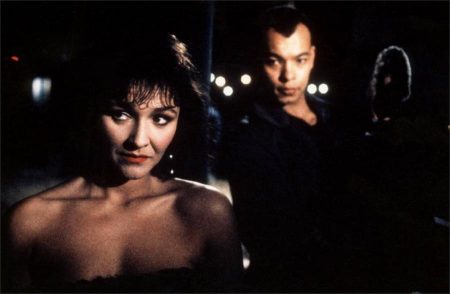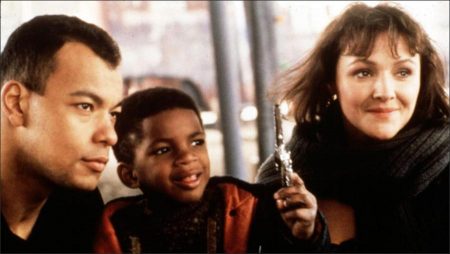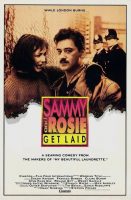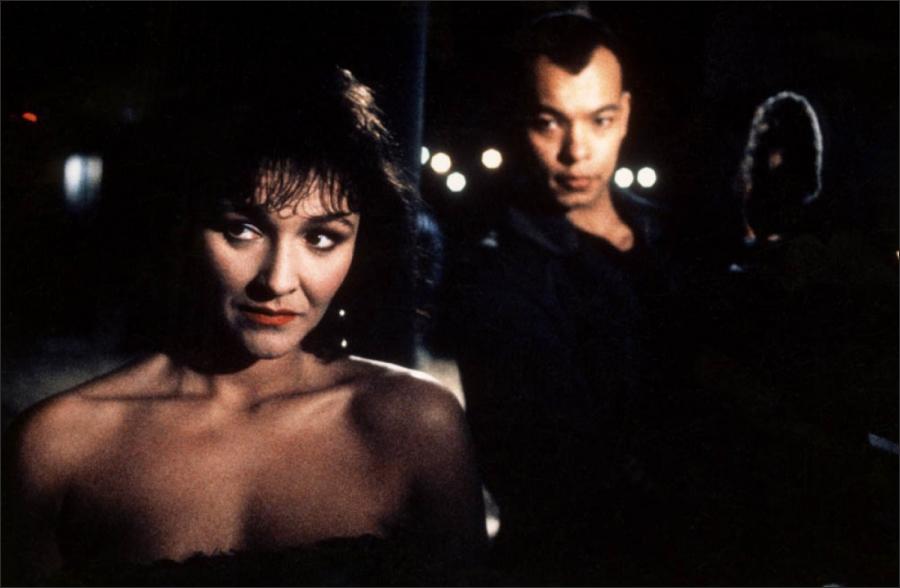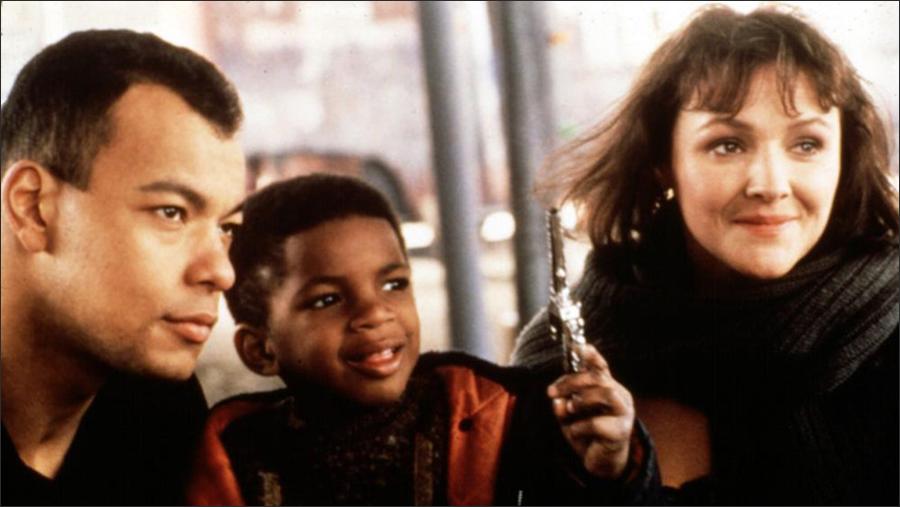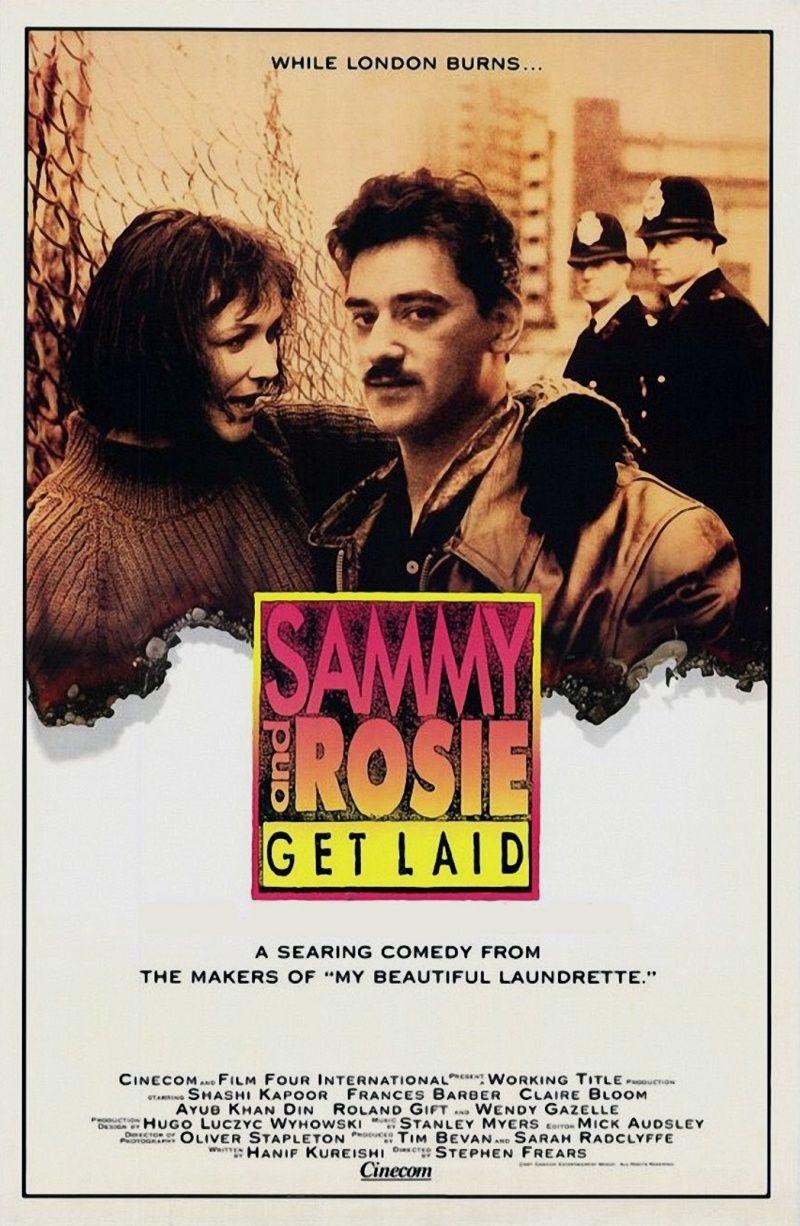Taglines: While London burns…
Sammy and Rosie Get Laid movie synopsis. Sammy and Rosie are an unconventional middle-class London married couple. They live in the midst of inner-city chaos, surround themselves with intellectual street people, and sleep with everybody – except each other! Things become interesting when Sammy’s father, Raffi, who is a former Indian government minister, comes to London for a visit. Sammy, Rosie, and Raffi try to find meaning through their lives and loves.
Sammy and Rosie Get Laid is a 1987 film directed by Stephen Frears, with a screenplay by Hanif Kureishi. It starred Shashi Kapoor, Frances Barber, Claire Bloom, Ayub Khan-Din, Roland Gift, Wendy Gazelle, Suzette Llewellyn, Meera Syal, Tessa Wojtczak and Emer Gillespie
Film Review for Sammy and Rosie Get Laid
ABOUT three-quarters of the way through ”Sammy and Rosie Get Laid,” there’s a particularly rich, riotously busy montage, a succession of shots of urban decay, exuberant West Indian street singers and three separate sets of lovers who alternately reminisce and argue while, at the end of a long London night, they make their circuitous routes to bed. The tempo of the editing increases. Suddenly the screen splits – horizontally – and we see each of the three couples, layered, more or less, one pair atop another, simultaneously but in separate images, as they achieve transitory satisfaction. That’s about all they can hope for.
The sequence virtually defines ”Sammy and Rosie Get Laid,” the second collaboration of Stephen Frears, the director, and Hanif Kureishi, the writer, whose first film together was the memorable ”My Beautiful Laundrette.” Mr. Frears and Mr. Kureishi have composed ”Sammy and Rosie” as if they were building a giant bonfire in a mock celebration of the achievements of contemporary British society and, by extension, of the civilized world. They throw everything on -love, death, sex, politics, violence. A lot of stuff doesn’t easily burn, but there’s also plenty that does.
The film’s opening and closing shots are accompanied on the soundtrack by the voice of Prime Minister Margaret Thatcher, enunciating measured truisms about inner cities and great tasks yet to be done. In between, there are half a dozen interlocking narratives, including one that features a maimed specter, the victim of political torture in a third world country. It’s Marley’s Ghost, walking the streets of today’s London as an illegal alien.
The specter is too much, yet overstatement is the style of ”Sammy and Rosie,” which is about England in the 1980’s and the heritage of a couple of hundred years of empire and colonialism. ”Sammy and Rosie” opens today at the Cinema Studio 1.
The new movie is far less orderly than ”My Beautiful Laundrette.” At times it seems as if Mr. Kureishi, having observed the rules of conventional film making in his first produced screenplay, had decided to allow himself a few liberties in his second. ”Sammy and Rosie” is at its best when it’s teasingly oblique. Often, however, it’s alarmingly blunt, especially when characters are permitted to say exactly what seems to be on the writer’s mind, straight from his notebook.
Sammy (Ayub Khan Din) and Rosie (Frances Barber) behave like a couple out of the 60’s. Their marriage is ”open,” built, they say with increasing lack of conviction, on ”freedom, plus commitment.” Though no national origins are ever mentioned, Sammy is a Pakistani, bred to be a hip Londoner. Rosie, a liberated Englishwoman, is writing a book on the social and political history of kissing. Sammy and Rosie are the sort of young people who attend the Royal Court and the latest cabaret theaters and seek out lectures on semiotics.
They also cultivate reverse chic. They have the means to live elsewhere, but they choose to remain in a rundown, multiracial London neighborhood where, as the film opens, the police have just accidentally shot and killed a 50-year-old black cleaning woman, mistaken for a 20-year-old black trumpeter. Like the good liberals they are, Sammy and Rosie regard as perfectly natural the tumultuous rioting and police confrontations that follow. ”An affirmation of the human spirit,” pronounces Rosie, and Sammy agrees, until his car is burned up.
The anarchy of their lives is accentuated by the arrival of Rafi (Shashi Kapoor), Sammy’s elegantly mannered, Oxbridge-educated father who, for years, has played a major role in the fascist political regime in what is probably Pakistan. Having, it seems, been tossed out of office, Rafi has come ”home” to his beloved England with his bags full of cash, determined to reconcile with Sammy and to renew his courtship of Alice (Claire Bloom), the middle-class Englishwoman whom he loved and abandoned when he was a young man.
As if these weren’t enough principal characters for one film, Mr. Kureishi also includes a handsome young black man, Danny (Roland Gift), who sometimes ironically refers to himself as Victoria, and who seeks out Rafi for political advice. (Just why a black revolutionary would go to someone popularly identified with a repressive fascist regime is never explained.) Danny stays around to become Rosie’s lover, while Sammy continues his affair with a pretty young American photographer, Anna (Wendy Gazelle), who’s putting together an exhibition to be called ”Images of a Decaying Europe.”
The patrician Rafi is appalled by the way Sammy and Rosie live. ”How’s marriage?” he asks Sammy early on. Replies Sammy, ”A scream.” Rafi’s as disgusted by the state of the England to which he’s returned as he is by Sammy and Rosie’s bohemian friends. Yet his renewed courtship of Alice only reminds him of his own failures as the once liberal politician who, in the name of necessity, became a willing tool of a dictatorship.
”Sammy and Rosie” is sometimes very funny, sometimes utterly opaque, and sometimes too direct for its own good, as when Rafi defends political expediency on the grounds that expediency is the lesson taught by empire. Alice sneers at Rafi as the representative of a regime that introduced flogging for minor offenses, nuclear capability and partridge shooting.
The movie doesn’t exactly lack for characters, incidents and ideas, which is both its problem and its fascination. There’s too much going on in Mr. Kureishi’s screenplay for any one person or thing to be satisfactorily explored. Mr. Frears acknowledges this overabundance by making a movie that is, itself, overabundant in detail. It’s almost breathless in its pacing. The film is constantly cross-cutting between characters, events and scene-setting images. As each character is overwhelmed to a greater or lesser degree by contradictory impulses, so is the film.
All the performances are good, but Miss Bloom is superb as the simultaneously romantic, firmly commonsensical Alice. Compared to the others, Alice is a fairly plain character. She’s also the bridge between an idealized past and the chaotic, multiracial present. ”Sammy and Rosie” is not an easy film to characterize. It’s too ambitious for its own good, which isn’t at all bad in an era when most movies are simply a succession of car chases.
Sammy and Rosie Get Laid (1987)
Directed by: Stephen Frears
Starring: Shashi Kapoor, Frances Barber, Claire Bloom, Ayub Khan-Din, Roland Gift, Wendy Gazelle, Suzette Llewellyn, Meera Syal, Tessa Wojtczak, Emer Gillespie
Screenplay by: Hanif Kureishi
Production Design by: Hugo Luczyc-Wyhowski
Cinematography by: Oliver Stapleton
Film Editing by: Mick Audsley
Costume Design by: Barbara Kidd
Art Direction by: David McHenry
Music by: Stanley Myers
Distributed by: Cinecom Pictures
Release Date: September 13, 1987
Views: 385
